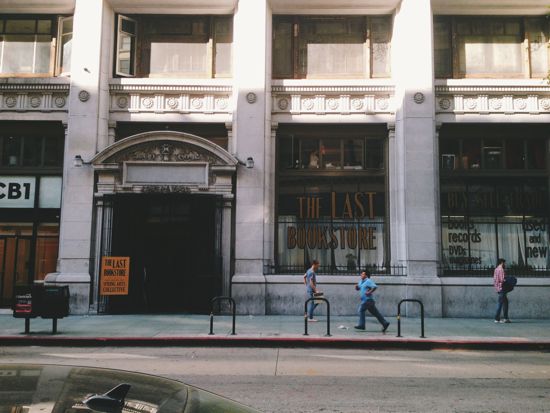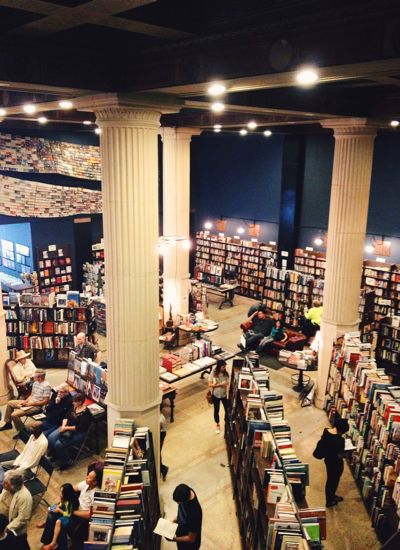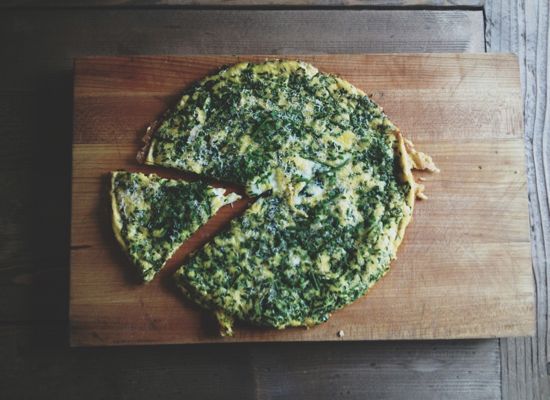Living with Poetry is an occasional series where we explore how poetry infuses our everyday lives. Catch up with past features here. Interested in sharing your own story about how poetry inspires you (in the kitchen or otherwise)? Contact me.
The second floor of The Last Bookstore in downtown Los Angeles is named "The Labyrinth," and for good reason. It houses 100,000 used books, all on sale for $1. Although a bargain, you actually pay more with your time, because it's easy to lose an hour or two browsing endless rows of books to find the gems you'll walk away with.
Did I mention that none of the sections are marked? Actually, that's not entirely true, because as you snake through the aisles, you'll sometimes come across a large yellow post-it note with a guide like "Law" or "History," but more often than not, the section you're looking for won't be that easy to locate.
I was determined to find the poetry.
At first, there seemed to be no order. Romance novels were stacked next to get rich quick guides. But as I made my way through, there did seem to be a modest effort to cluster books by topic. Eventually, I stumbled on a few rows of cookbooks. There was a pie and pastries cookbook from Martha Stewart, probably one of the first books she published, and plenty of Better Homes and Gardens titles. Smashed between two 90s diet books was a slim, hardback copy of Epicurean Recipes of California Winemakers, a cookbook published in 1969 and I'm certain out of print, compiled by the Wine Advisory Board. I took it home.
My husband was very generous to help me, and just when I felt like turning around, he pulled down a worn, paperback book of children's poetry. A ha! Despite the fact that the lingering dust was starting to give me a headache, and my stomach was starting to grumble, I refused to believe that with 100,000 books on the shelf, there was no poetry.
The poetry section turned out to be three small shelves on the opposite side of the vinyl records. There were some old copies of literary magazines like RATTLE and the Denver Quarterly, and some paperbacks of obscure poets. There was a Rita Dove collection that I almost took home, but it was covered in notes from the previous owner.
After an hour and a half, I walked away with my wine cookbook, and a copy of 2002's Best Food Writing. For $2.18, I'd say that's the best deal in town.
We left just as I was beginning to feel faint with hunger, and walked two blocks over to Artisan House, an urban restaurant with a rooftop garden, seasonal dishes, and Sunday movie nights. With a philosophy of "Break bread. Share wine. Feed the soul," I knew we'd stumbled onto something good. We had other plans and left before Top Gun started, but we sampled a few memorable dishes during our meal, including the grass fed sliders below, and a salad of nectarines, burrata, hazelnuts, and a thick balsamic sauce. It was heavenly. The kind of flavors that both excite and cleanse your palate, and remind you what summer eating is all about. Naturally, it didn't take long to bring those flavors home.
Grilled Nectarine Panzanella
I recently borrowed the flavors from our Artisan House meal for a summer panzanella. Precise measurements are tricky with salads, especially the kind that benefit from a "clean out the fridge" approach, but I hope my description will steer you in the right direction. The beauty of a festive salad like this is you can improvise a bit. If you have baby kale, use that instead of spinach. No mozzarella? Try goat cheese. Add toasted almonds! You get the idea.
A large handful of spinach
A large handful of microgreens
4 ounces fresh mozzarella, roughly chopped
4 slices prosciutto, torn
2 to 3 nectarines, sliced and grilled
1 small shallot, thinly sliced
4 green onions, grilled, then roughly chopped
3 to 4 basil leaves, torn
1/2 baguette, chopped into 1-inch cubes and toasted
Lots of chives
Dressing
Balsamic vinegar
A drizzle of honey
Salt & Pepper
Extra-virgin olive oil
Place all the salad ingredients into a large bowl and have two wooden spoons nearby. Give the dressing a quick whisk, then pour over the salad and gently toss until everything is evenly coated.










